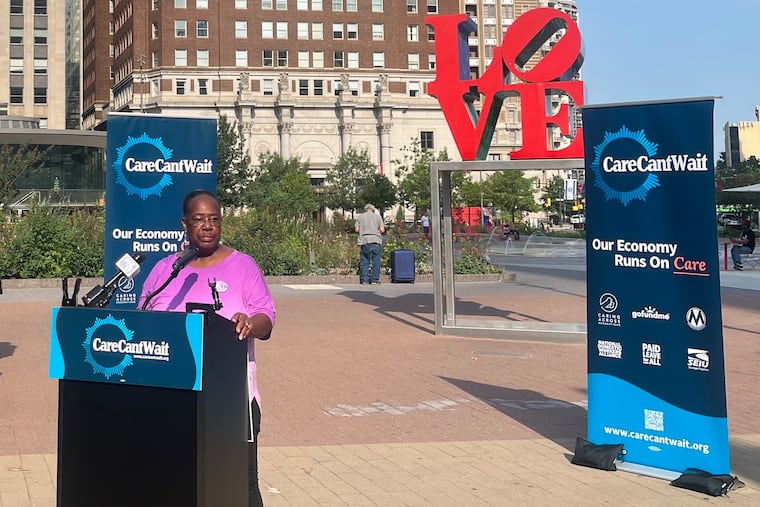Pa. workers are part of a cross-county bus tour to put the ‘care economy’ on voters’ minds
Organizers say the crisis in care for the elderly, children, and those living with disabilities is a nonpartisan issue but definitely political.

In an election where the cost of living is on the ballot, a coalition of child-care and home aid workers, and the families who depend on them, want voters to keep the “care economy” top of mind. They’ve embarked on a cross-country bus tour that includes such swing states as Pennsylvania, Wisconsin, and Michigan, to explain why.
LOVE Park on Wednesday marked the fifth stop on the tour, where workers such as Wanda Carroll-Russell, 60, discussed the difficulties of caring for older clients seven days a week for $11 an hour with no benefits, despite being in the industry for 18 years.
The Hatfield resident receives health care through Pennsylvania’s health insurance marketplace but lacks dental and vision coverage.
“I live paycheck to paycheck, enough to pay the bills,” she said. “I use a magnifying glass to help me read with my glasses and I haven’t been to the dentist in five years.”
Advocates, including members of unions such as AFSCME and SEIU Healthcare PA, argue that the failings of the care economy hurt families by keeping residents charged with looking after a loved one out of the workforce due to high costs of care for older, young, or disabled relatives, or forcing families back into the workforce prematurely because Pennsylvania does not offer paid family leave.
While the issue is nonpartisan, it is very much political and requires solutions from the federal government, as well as state and local lawmakers, said Ai-jen Poo, executive director of Caring Across Generations and president of the National Domestic Workers Alliance.
“We know this issue is touching everyone in rural communities, urban, suburban, this is an issue that everyone is affected by,” she said.
Fixing the problem requires deep investments, advocates say
From the federal government, Care Can’t Wait, a coalition of groups and individuals advocating for access to child care, paid family and medical leave, and more, is asking for a $400 billion investment in Medicaid home and community-based services, which the organization argues would create more than one million jobs and help previously unpaid family caregivers return to the workforce.
Passing the Child Care for Working Families Act, which was introduced in the House and Senate last year but never made it out of the committee, would mean that no family would have to spend more than 7% of their income on child care, advocates say. And passing paid family and medical leave legislation would ensure that workers get paid time to care for a newborn or address a personal or family-related illness.
State Rep. Mary Jo Daley said Pennsylvania made “small progress” in the latest budget by passing a $26 million increase for the Department of Human Services’ subsidized child-care program, as well as a tax credit for businesses that contribute to their employees’ child-care costs.
Those successes, however, have not been without criticism. Advocates argued the child-care boost only maintained the status quo by replacing pandemic-era funding. and low wages remain.
What’s more, Daley said, the legislature has yet to pass a bill that would establish family and medical leave in the state. She said she hoped to make some progress in the fall.
When child care is more than rent
While most care workers say the work they do is a labor of love, working for a big-box store can sometimes be a wiser financial choice.
Hakim Rhodes, 32, is a health aid in Merion Station who enjoys the work, but as he gets ready for marriage and looks toward family planning, he wonders how sustainable the job is.
“How am I going to be able to provide for them, to get the things I need?” he asked, with his charge, and soon-to-be brother-in-law, next to him.
Michael Anderson, 42, said his cerebral palsy means he requires 24-hour care. Without Rhodes, he wouldn’t be able to do anything.
“He’s my hands,” said Anderson, who is a legislative aid for the Arc of Philadelphia. “We need to recognize this work as a profession. The salaries need to go up for everyone.”
Latonta Godboldt, 42, who runs a Philadelphia child-care center, said the same needs to happen for people caring for children, and parents need help paying for said care.
The average annual cost of child care in Philadelphia exceeds $13,000, according to Winnie, a national marketplace for licensed child-care centers.
Philadelphia resident Taylor Austin, 31, is now a campaign manager for MomsRising, which advocates for a variety of issues affecting families. She sends her daughter to a day-care center across county lines because finding closer slots that fit her budget was a Herculean task.
“We can only afford to send her part time because full-time child care costs more than our rent,” said Austin.
Pressuring presidential candidates and local lawmakers is of utmost importance, say advocates, who are promoting a petition in hopes that ABC News will ask presidential nominees Kamala Harris and Donald Trump what they plan to do about the rising costs of care during the scheduled Sept. 10 debate.